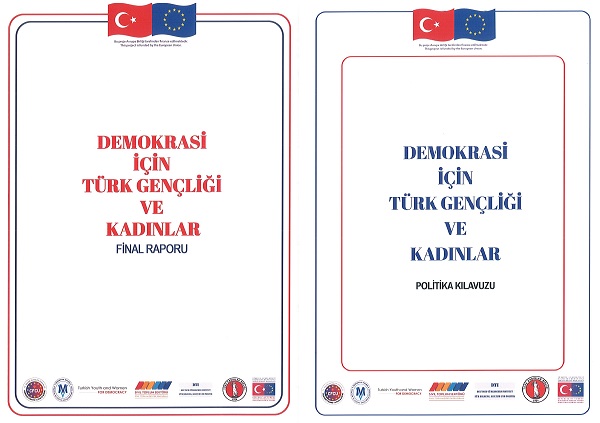2 New Books, Marmara Group Foundation EU and Human Rights Platform published 2 New Books
Marmara Group Foundation EU and Human Rights Platform have published two separate books about the EU Project "Turkish Youth and Women for Democracy", which they have successfully completed. You can also read the books titled "Turkish Youth and Women for Democracy Final Report" and "Turkish Youth and Women Policy Guide for Democracy" on the website "democrasiyolunda.com".
We present the preview of our Final Report book below.
It is a known fact that many needs in human history have been met by the organizations of societies. In modern societies, in addition to representative governance structures, it is observed that organizations aiming to undertake social responsibilities voluntarily, and all non-governmental organizations (NGOs), whether in legal structures such as associations, foundations, professional chambers, or initiatives such as platforms, are gaining strength. In our country, the increasing effects and weight of NGOs in our daily life and management structure are felt more and more every day. A better communication among themselves as the strengthening of NGOs and the development of closer cooperation has also indispensable for the establishment of a participatory democracy in Turkey.
Despite increasing role of NGOs in Turkey, due to lack of communication among themselves healthy synergy and efficient teamwork have not yet reached the expected level. Due to the lack of a national NGO Center (except for roof formations such as STGM, Civil Think) that Facilitating communication between NGOs and serves the development of NGOs many NGOs are not even aware of their existence is not only failing to learn about the activities of other related NGOs in Turkey.
The prerequisite for NGOs to fulfill their functions adequately, to carry out their work successfully and to increase the influence of the civil society field depends on their democratic relationship with each other. Various developments in the world and Turkey, have led to major changes encountered in the field and NGOs are affected by this change in NGOs.
Due to the dynamic nature of the CSO field on a world scale, besides the fact that there are frequent changes in communication, information and members, a series of special political / economic crisis in Turkey has led to significant changes in their structuring by reducing the opportunities of NGOs to find sponsors from local and national sources. Apart from the funds of international institutions such as the European Union, non-governmental organizations seem to have no financial resources left. Therefore, the need for trainings that will enable CSOs to access these funds that will improve their financial capacities is increasing. As a result of the developments in technology, the decrease in the prices of digital equipment and services, the Internet has begun to be widely used among leading NGOs, but most of the local NGOs do not have the same level of facilities and knowledge.
Many private networks have recently been formed among NGOs in various sub-sectors such as women, environment and human rights.
Based on this need, we present to their attention the information and data they will need in project implementations that encourage the participation of young people and women in democratic processes, as a comprehensive and up-to-date resource.
We hope that our knowledge sharing initiative creates a basis for collaboration and networking, teamwork.It contributes to the capacity development of CSOs as a result of the transfer of knowledge, opinion and experience through the increasing communication dynamics between all relevant actors of society.
Today, we are experiencing very serious transformations in social life and our intellectual world. While the policies carried out by international companies from the nation-states of modern times cause us to experience the pain of the transition to the global world, the winds of postmodernism in philosophy, politics and art take everything in front of it. Classical liberal democracies' style of representational politics can no longer respond to the needs and complex political life of the "new society".
Discussions in the social sphere are around the idea of "democratization of democracy" and transforms participatory democracy into a participatory state open to interaction through civil networks and initiatives.
Efforts are underway to move from the "part-time" citizen of the representative democracy, who feels a citizen only every four or five years, to the "full-time" active citizen, who always seeks and opens the way to protect their problems through civil networks and organizations.
Civil society activities carried out in the same direction in our country, the negative effects of the transition from the parliamentary system to the Presidential system first, then the unexpected July 15 coup attempt and the Covid-19 epidemic immediately thereafter, detached the desired citizen from the public sphere and sentenced him to freedom within his own four walls.
While we put this work in the hands of the Civil Society Organizations, which are the pioneers and devotees of the transition to full-time citizenship, we also dedicate them to them.
We thank to Turkey and the European Union, the T.R. Ministry of Foreign Affairs EU Presidency for their financial support in preparing this book.
Müjgan Suver


